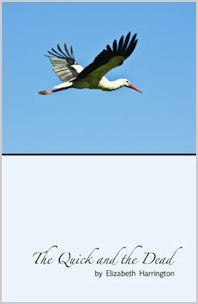nycBigCityLit.com the rivers of it, abridged


Reviews
Fall 2011
"I come complete":
Elizabeth Harrington's The Quick and the Dead

The Quick and the Dead
by Elizabeth Harrington
Grayson Books, 2010; 30 pages, $10.00
ISBN: 978-0-9785382-6-2, paper
http://www.graysonbooks.com/TheQuickandTheDead.htm
Reviewed by Brant Lyon
When faced with life's most difficult challenges and dealing with personal tragedy, perhaps what most sets a poet apart from someone else is the ability to put into words in the most artful way the brutal, the delicate, ineffable, obvious, esoteric, or universal in human experience. Or, as that homespun and inelegant saying about life's lemons puts it: to make lemonade.
Elizabeth Harrington's The Quick and the Dead was winner of the 2010 Grayson Books Poetry Chapbook Competition. It now enjoys its second printing. In consideration of its subject, that's a lot of lemonade. It chronicles her story of transplant surgery: the small intestine taken from a mysterious donor—an anonymous thirteen-year-old boy from Minnesota—and, as though a life-giving baton in a relay race, is passed to her. Language rich as it is lean, Harrington's words are precise yet associative, daring yet tender, dry-eyed though deeply felt. Crafted with lapidary finesse and concision, each poem with the exception of three, fits neatly on one page, refracting another facet of the narrative. It's a quick read, but one that invites lingering.
What's most intriguing is how successfully and powerfully Harrington universalizes in her unique journey the obsessive, altered states of mind that life and death crises thrust upon us: when the entire world becomes an intensified projection of hopes, fears, and search for meaning, and everyday objects take on symbolic significance, events assuming mythical proportion burgeoning omens, approaching the mystical.
Like the skein of time, the long strand of small intestine is "unspooled" from her donor and "rewound" inside her abdomen that her "future's future" and she "would keep going." As she speculates about the circumstances of his death and fantasizes about his identity, Harrington's pathos is almost like that of an adopted child that yearns to know its birth mother. In the opening poem, she imagines his hands "arranged over vacancy" and suggests the reader imagine her own chilly hands, just as, in the next, her limbs are arranged in preparation for the operation that will give her a chance of survival. In another poem, post-surgical pills have star names: Cytovene, Reglan; a blood thinner bruises her skin with "breath taking sunsets."
Often Harrington's metaphors and imagery are multi-layered, even delightfully contradictory. A lost pair of sandals that represent a romantic past are at once talisman ("When I slipped them on, I was someone else.") and sentimental, however bitter, reminder of what's missing ("the ones I wore … before he disappeared"). The lights of the hospital ICU are always on, as they are "in a gambling casino or interrogation room." What more economical and vivid way to convey the duality of thrilling high-stakes risk, of beating the odds, up against the fear, menace, and invasiveness of major surgery?
Harrington somehow simultaneously explodes each moment as she contracts it. These poems are intimate, exquisite, and broad-minded, philosophical. For all their earthiness, they never bog into the prosaic, nor, at their most expansive and subtle, float into mere abstraction. They are firmly grounded, rooted in familiar relationships that add elements of wry humor and uplift. While on a business trip, the doctor she consults to learn about her condition notices underwear spilling out of her valise and asks if she'll be staying. Later, as her surgeon, he'll tell everyone on the ward that she's a pain in the ass. Her mother shows up bedside with a book of crosswords, Rubik's Cube, and glow-in-the-dark digital solitaire. Funny and real. Profound yet buoyant.
Though she says there are but two weathers in her life: rain and not rain, a recurring image of light pervades. "You must keep the sun as your guide as if it were attached to you, like a balloon. Like the body. Warm, but not too." And, in the end, we see, "it makes all the difference how you survive."
Brant Lyon is a poet, fiction writer, and musician. He is senior editor for Uphook Press and producer and host for Hydrogen Jukebox, a reading series in NYC where poets recite with an improvisational band. A collection of his poetry, You Are White Inside, will be published Fall 2011 by Three Rooms Press.